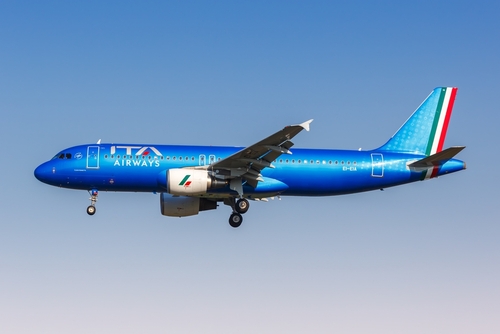
With this choice, the MeF (ministry of economy and finance) obtains the maximum possible participation in order to define Air Ita as still an Italian company
Until a few days ago, the proposal from MSC and Lufthansa seemed to have an advantage in the dossier relating to the acquisition of the new Italian national airlines ITA Airways, which belongs to the company for civil transport “Ita s.p.a.” but, according to an institutional note, from 31 August, the Italian Ministry of Economy and Finance seems to have started an exclusive negotiation with the Certares-Delta-Air France consortium.
The decision, somewhat unexpected for some analysts, was taken considering the conditions proposed by the competing factions and the Italian government, as a public shareholder, preferred to continue negotiations with the consortium capable of guaranteeing greater control by the MeF (45% ) compared to the 20% offered by MSC and Lufthansa.
Both consortiums vying for the acquisition have valued the Italian airline about 950 millions of euros and the American fund Certares, created in 2012 in New York, with offices in Luxembourg and Milan and with a market value of 10 billion dollars, would be ready to pay 600 million euros (in addition to any future bonuses if Ita achieves good financial results) for 55% of the company, with the possibility for the Italian state to have 2 out of 5 members on the Board with ample powers of veto on industrial and strategic choices as well as the appointment of a trusted president for the entire company. The Air France company, which had already actively collaborated with Alitalia in the past and which has always declared its interest in deepening the relationship for the management of air traffic to and from the Italian territory, in the coming months, would participate with 9.9% of the shares and Delta with 5%, thus reducing the Certares share to 40.1%.
The offer presented by Lufthansa and MSC provided for the payment of approximately 850 million euros for an 80% share and not enough guarantees on the decision-making power granted to the Italian state on choices, such as the long-standing problem of redundancy, which would have generated certain discontent among the trade unions and associations involved in safeguarding the Italian airline workers.
Lufhtansa and MSC let it be known, through an official note, that they consider their offer to be still the most advantageous for Air Ita, although a privatization, almost total, of a national airline with incalculable potential such as the Italian one, may be not very advantageous at all.
The Lufhtansa company understands the will, on the part of the Italian Ministry of Economy and Finance, to lean towards an offer that guarantees greater participation and significant decision-making power. However, the German group maintains an excellent positioning on the Italian market thanks to the brands already managed, including Air Dolomiti with approximately 4 million passengers and more than 130 daily departures from 21 different destinations.
The decisions on the acquisition are up to the current Italian Economy Minister who could possibly sign a simple memorandum of understanding which, however important, would not bind the incoming government to actually sell Air Ita or could define a preliminary act that it would be binding and would provide, in the event that the new government were to decide to stop the negotiations, a millionaire penalty in favor of potential buyers.
With the elections at the gates, the Air Ita issue becomes crucial for the intrinsic importance of an acquisition of this magnitude and the management of the parties involved will be essential to avoid collecting yet another flop and for the definition of an agreement that guarantee the control by the state necessary to define truly Italian the most important airline of the peninsula. The eventuality of an airline entirely administered by the Italian government has always seemed not very pragmatic and difficult to apply. Therefore, the certainty of reliable partners who really care about the company’s success is essential.
Author: Alessandro Fiorentino



 Subscribe
Subscribe